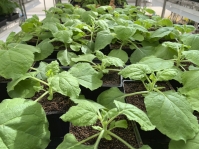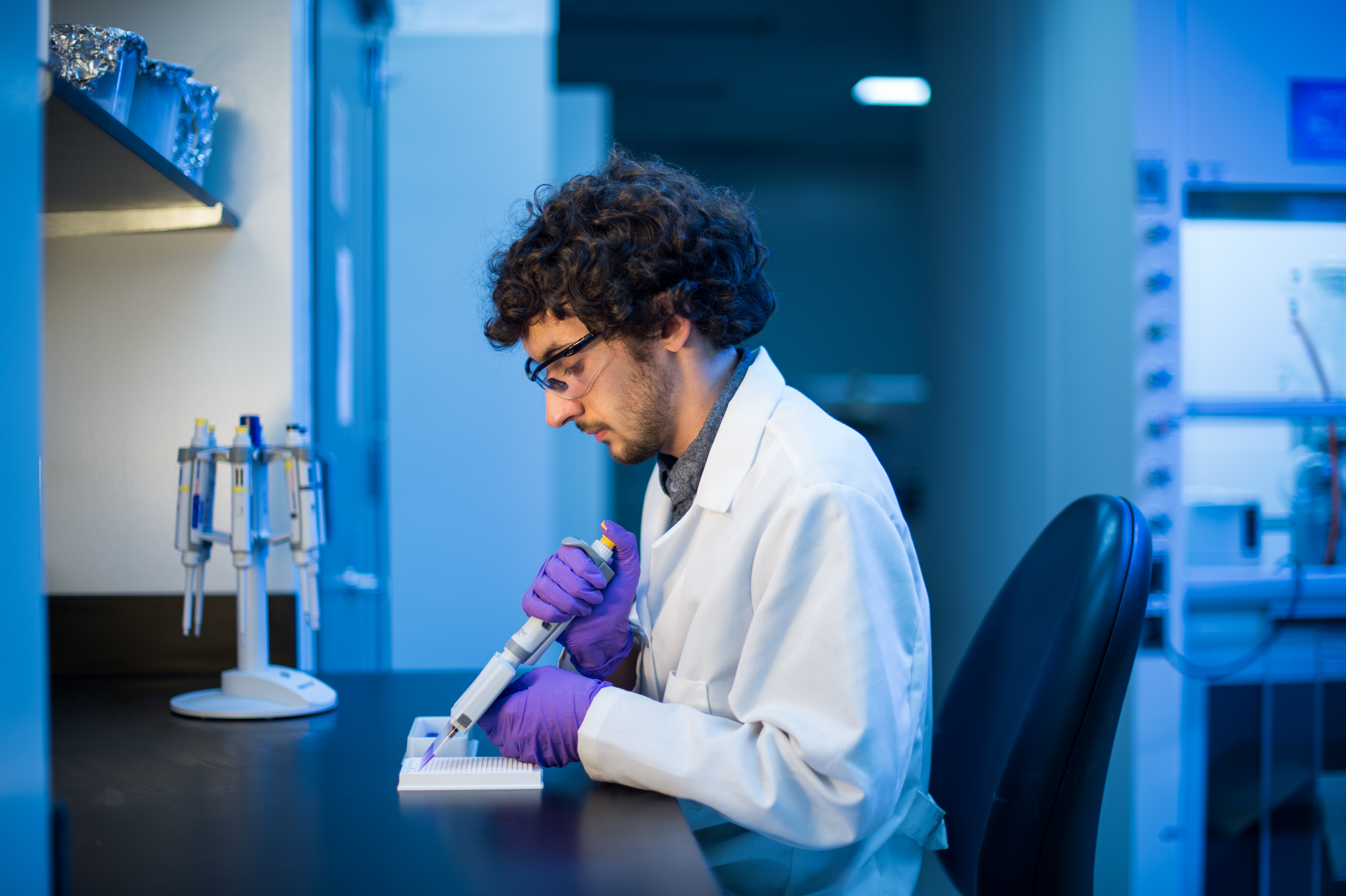Medicinal chemistry involves the application of a number of specialized disciplinary approaches all focused on the ultimate goal of drug discovery. Drug target identification and validation, rational (target-based) drug design, structural biology, computational-based drug design, methods development (chemical, biochemical, and computational), and “Hit-to-lead” development are all aspects of medicinal chemistry. The techniques and approaches of chemical biology, synthetic organic chemistry, combinatorial (bio)chemistry, mechanistic enzymology, computational chemistry, chemical genomics, and high-throughput screening are all used applied by medicinal chemists towards drug discovery.
For our Pharm.D. students, medicinal chemistry is integrated with pharmacology to present a coherent picture of the principles of drug action. Pharmacology mainly deals with drug action at the cellular, tissue/organ and organism levels. Medicinal chemistry focuses on the molecular aspects of drug action: interactions with the drug targets from both the drug and the target point of view, the relationship of drug chemical structure to drug action and the effects of metabolism on the drug structure and hence its action.
- History of Medicinal Chemistry at the University of Michigan
The Department of Medicinal Chemistry and the Interdepartmental Program in Medicinal Chemistry (Med Chem IDP), while inextricably linked, are distinct with related but separate missions. Historically, the Med Chem IDP is ~60 years old, while the Department of Medicinal Chemistry is ~25 years old. Other key differences are the composition of the respective faculties and the responsibilities for the programs as briefly summarized below.
As a discipline, Medicinal Chemistry in the United States started at the University of Michigan, College of Pharmacy with Professor F. F. Blicke in 1926. Prof. Blicke initiated the first graduate education program in Pharmaceutical Chemistry, focusing on synthetic organic chemistry. The program expanded in the 1950s to include analytical aspects and pharmaceutics. After Prof. Blicke’s retirement in 1960, his former student, Prof. J. H. Burkhalter returned to the College and argued for an independent graduate education program in Medicinal Chemistry. Until that time, Ph.D. degrees in the College were in Pharmaceutical Chemistry, Pharmacy and Pharmacognosy. Since there were so few Medicinal Chemistry faculty in the College (2), Rackham would not approve it. However, in 1967, under the direction of Graduate School Dean Alfred Sussman and with the participation of a core group of interdepartmental faculty, the Interdepartmental Program in Medicinal Chemistry (Med Chem IDP) was established. The College then applied for a Pharmacological Sciences Training Program Grant (PSTP) at the same time as the Department of Pharmacology. NIH had a rule that no institution could have duplicate training grants and asked that the two applications be merged. This was done and Dean Sussman was made the first director of the PSTP. The directorship has alternated between Medicinal Chemistry and Pharmacology ever since. The mission of the Med Chem IDP was, and still is to train students in a broad range of chemistry-based disciplines so that its graduates are able to apply the rigor and methods of the physical sciences to drug discovery research. This was the first such formal program in the country and involved the College of Pharmacy, the College of Literature, Science and the Arts, the Medical School, and the School of Dentistry.
The Med Chem IDP is currently administered by the Horace H. Rackham School of Graduate Studies with direct oversight by the College of Pharmacy. The Med Chem IDP includes all faculty from the Department of Medicinal Chemistry and faculty with appropriate interests from the Department of Pharmaceutical Sciences in the College of Pharmacy as well as select faculty from a variety of schools (e.g., Literature, Science and the Arts, Medical School) and departments at Michigan (e.g., Biological Chemistry, Biophysics, Chemistry, Pathology, Pharmacology, Radiology). The Med Chem IDP serves to administer the Med Chem PhD program, with responsibility for graduate student recruitment, training, progression and graduation. Approximately half of the Med Chem IDP faculty have their primary appointments outside of the Department of Medicinal Chemistry. These faculty currently mentor ~20% of the Med Chem PhD students and are fully engaged in the Med Chem PhD program in many other ways including seminar attendance, recruitment of students, teaching in our graduate courses, and serving on candidacy and dissertation committees. There is an annual meeting of the Med Chem IDP faculty to review the status of the IDP and the students.
In 1999, in response to the significant growth of the College of Pharmacy under previous Dean Ara G. Paul, then Dean George L. Kenyon initiated a process of departmentalization of the College of Pharmacy. The rationale included the recognition that the expertise and research areas of the College faculty had grown to be so diverse that it was impossible for a single person to adequately mentor and administer all faculty. Additionally, the administration of the professional PharmD and clinical programs and the research enterprise of the College was so complex that a departmental structure was needed to efficiently carry out our mission. Prof. James K. Coward was the first Chair of the Department of Medicinal Chemistry and Director of the Med Chem IDP. The Department of Medicinal Chemistry is the administrative component of the College of Pharmacy that oversees the Medicinal Chemistry faculty, research scientists and postdoctoral fellows (e.g., recruitment, mentoring, evaluation), has responsibility for the medicinal chemistry PharmD and PhD courses and seminar program, and coordinates the participation of medicinal chemistry faculty in College-level committees and other administrative duties. The Department of Medicinal Chemistry also administers the Med Chem IDP activities (e.g., student recruitment and progression). In 2017, the position of Director of Education was established. In 2022, the positions of department chair and IDP director were separated. In 2023-24, a national search was conducted to recruit a new department chair, the first time a chair was recruited from outside of the department.
Chairs/Directors of Medicinal Chemistry at Michigan
Fredrick F. Blicke (Director, IDP) 1926 - 1960
Joseph H. Burckhalter (Director, IDP) 1960 - 1972
Raymond Counsell (Director, IDP) 1973 - 1976
Leroy B. Townsend (Director, IDP) 1977 - 1997
James K. Coward (Chair and Director, IDP) 1998 - 2004
Ronald W. Woodard (Chair and Director, IDP) 2005 - 2011
George A. Garcia (Chair and Director, IDP) 2012 - 2020
Mustapha Beleh (Director, Education) 2017 - present
Heather A. Carlson (Chair and Director, IDP) 2020 - 2021
George A. Garcia (Interim Chair) 2022 - 2024
Amanda L. Garner (Director, IDP) 2022 - present
Robert H. Cichewicz (Chair) 2024 - present
- Department Organizational Chart







